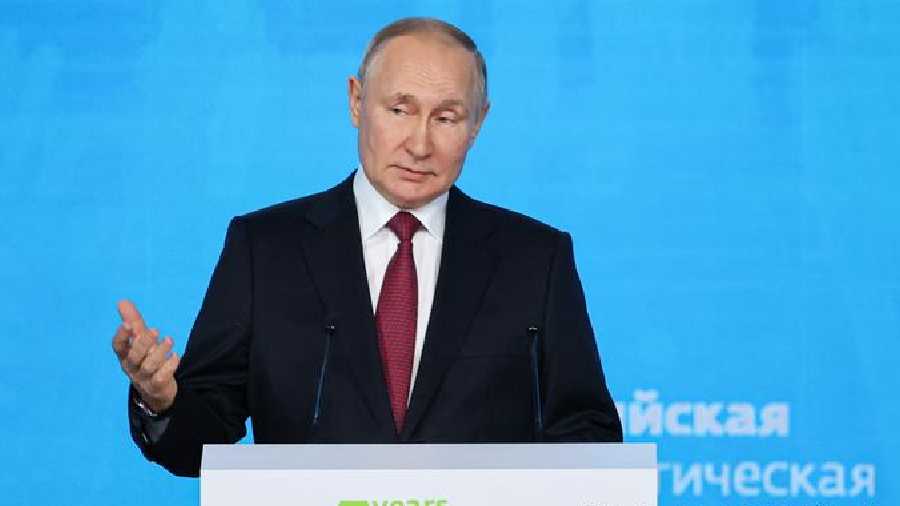The reporting job in Moscow had everything Evan Gershkovich was looking for, his friends said: experience in a far-flung location with the chance to connect with his Russian roots.
Gershkovich, 31, an American journalist born to Soviet émigrés, moved from New York to Russia in late 2017 to take up his first reporting role, a job at The Moscow Times and, his friends and co-workers said, he quickly embraced life in Moscow.
“He had no hesitation; he was really ready to try something totally new,” said Nora Biette-Timmons, a friend from college and the deputy editor of Jezebel, adding, “I remember so distinctly how much he loved what he was doing.”
In January 2022, he was hired as a Moscow-based correspondent for The Wall Street Journal, a dream job, his friends said. But on Thursday, in a move that intensified tensions between Moscow and the West, Russian authorities said they had detained the journalist, accusing him of “spying in the interests of the American government”.
Russia has not provided any evidence to back up the accusations, and Gershkovich, and his employer have denied the allegation. Russian state media said Gershkovich was being held at a prison in Moscow to await trial after being transported from Yekaterinburg, a city 1,450km away in the Ural Mountains where he was arrested. He is the first American journalist detained on espionage charges since the end of the Cold War and faces up to 20 years in jail.
Dozens of global news organisations have condemned the arrest and President Joe Biden on Friday called for Gershkovich’s immediate release. Top editors and press freedom organisations from around the world wrote to the Russian ambassador to the US on Thursday, saying that the arrest was “unwarranted and unjust” and “a significant escalation in your government’s anti-press actions”.
The letter went on: “Russia is sending the message that journalism within your borders is criminalised and that foreign correspondents seeking to report from Russia do not enjoy the benefits of the rule of law.”
Friends of Gershkovich described him as an extroverted journalist with an abiding love for Russia and its people.
Polina Ivanova, a correspondent who covers Russia and Ukraine for the Financial Times, said she met Gershkovich soon after they both arrived in Moscow in 2017.
“Evan is a completely gifted reporter and someone for whom journalism is incredibly natural because he is an amazing talker and charms everybody and is very funny,” she said.
“He always understands Russia with an extreme amount of insight and nuance and depth and that is based on the fact that he’s lived and breathed this story for the past five years,” she said. “And that’s what makes this all so painful because he really cares so much about what is happening in the country.”
Known to many of his American friends as “Gersh”, Gershkovich grew up in Princeton, New Jersey. His parents had emigrated to the US from the Soviet Union, part of a wave of Jews who left in the 1970s.
Gershkovich studied philosophy and English at Bowdoin College in Maine, graduating in 2014. He then lived in Bangkok for a year on a Princeton in Asia fellowship.
After college, Gershkovich moved to New York City and worked at The New York Times as a news assistant, handling reader emails for the public editors Margaret Sullivan and Liz Spayd, from early 2016 until September 2017. He left The Times to take The Moscow Times job and get the reporting experience he craved. In 2020, Gershkovich started covering Russia and Ukraine for Agence France-Presse, then moved to The Wall Street Journal.
Jazmine Hughes, a staff writer for The New York Times Magazine who became friends with Gershkovich when he worked at The Times, described a message he sent her in December 2021 telling her the news about his new job at The Journal.
“Remember when we were in The New York Times cafeteria and you were convincing me to give journalism a shot for another few years and not give up just yet?” Gershkovich wrote to Hughes. “I just got hired by The Wall Street Journal. I’m the Moscow correspondent. I’m in the bureau. I did the thing. Look at us!”
Hughes said in an email: “Getting the Moscow correspondent job was basically his too-big-to-dream job.”
Joshua Yaffa, a writer for The New Yorker who first met Gershkovich five years ago in Moscow, wrote in an article on Friday that Gershkovich, like some other western reporters, had relocated outside of Russia after the war began, but returned last summer because his accreditation was still valid.
In recent months, Gershkovich had written articles about an artillery shortage hampering Russia’s war effort in Ukraine and an acquiescence to the war by most Russians. His last byline was on March 28, on a story about Russia’s dimming economic outlook as it is squeezed by western sanctions.
Emma Tucker, the editor-in-chief of The Wall Street Journal, said in an email to the staff on Friday that the publication was working with the state department as well as legal teams in the US and in Russia to secure Gershkovich’s release.
“Evan is a member of the free press who right up until he was arrested was engaged in news gathering,” Tucker wrote. “Any suggestions otherwise are false.”
Ivanova of The Financial Times said there were now very few western journalists still travelling to Russia.
"What he was doing was incredibly important,” she said. “It was a story that really needed to be told because we need to understand it.” She added: “It helps no one if Russia remains a black box.”
New York Times News Service










